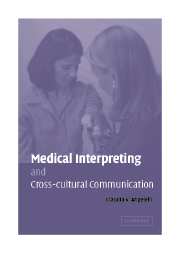Book contents
- Frontmatter
- Contents
- List of figures
- List of tables
- Acknowledgments
- List of abbreviations
- Prologue
- 1 Questioning invisibility
- 2 Communication in the medical encounter
- 3 A different set of lenses
- 4 California Hope: a public hospital in changing times
- 5 Putting it all together
- 6 Finding visibility
- 7 Interpreters' voices
- 8 Emerging metaphors and final words
- References
- Index
8 - Emerging metaphors and final words
Published online by Cambridge University Press: 22 September 2009
- Frontmatter
- Contents
- List of figures
- List of tables
- Acknowledgments
- List of abbreviations
- Prologue
- 1 Questioning invisibility
- 2 Communication in the medical encounter
- 3 A different set of lenses
- 4 California Hope: a public hospital in changing times
- 5 Putting it all together
- 6 Finding visibility
- 7 Interpreters' voices
- 8 Emerging metaphors and final words
- References
- Index
Summary
In the ICEs they facilitate, interpreters play a wide variety of roles. In the present study, that variety was evidenced by how interpreters perceived their roles, enacted them, and talked about them. During interviews and conversations, the terms used by interpreters to talk about their roles illustrated the tension between the prescribed role (invisible) and the actual role (visible). However, this tension only seems to exist at the level of the perception or belief, because in practice, the tension gets resolved. The interpreters shadowed in this study became visible partners in their interpreted communicative events. Many of them described their varied roles using metaphors. In the following sections, we explore some of those metaphors.
Interpreters as detectives
As we saw in chapter 6, patients do not always give specific answers to HCPs' questions. Sometimes HCPs even ask interpreters to get information without giving them a specific script. Interpreters then take the lead in a line of questioning, in order to get the answer. In other words, they become detectives, questioning the patient carefully, hoping to discover the answer. Interpreters perceive this as an enormous responsibility, not just because the HCP depends on this answer to take action, but also because in many instances, interpreters have no guidance as to what exactly they are supposed to ask. In spite of this, interpreters willingly take on this responsibility.
- Type
- Chapter
- Information
- Medical Interpreting and Cross-cultural Communication , pp. 129 - 141Publisher: Cambridge University PressPrint publication year: 2004

